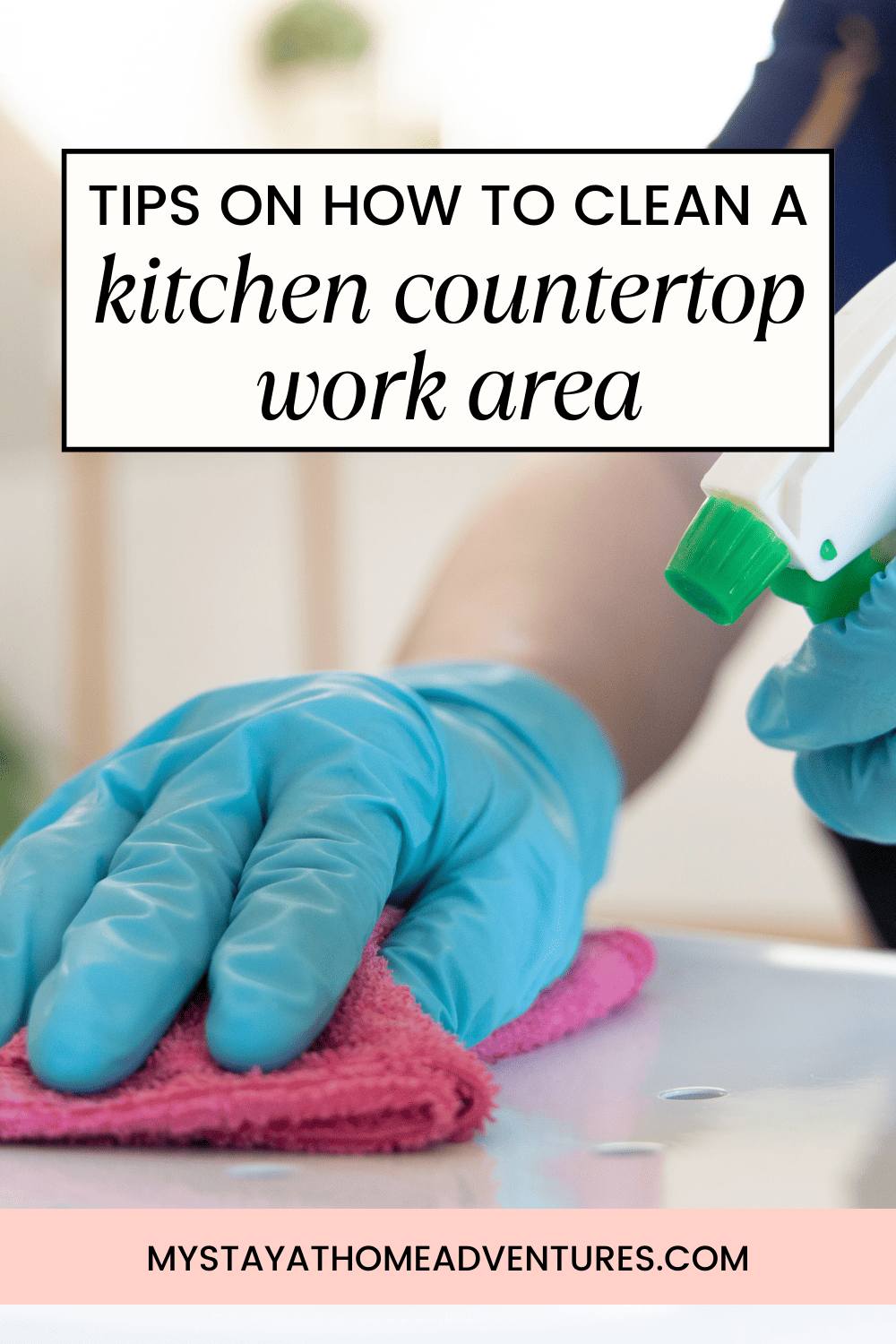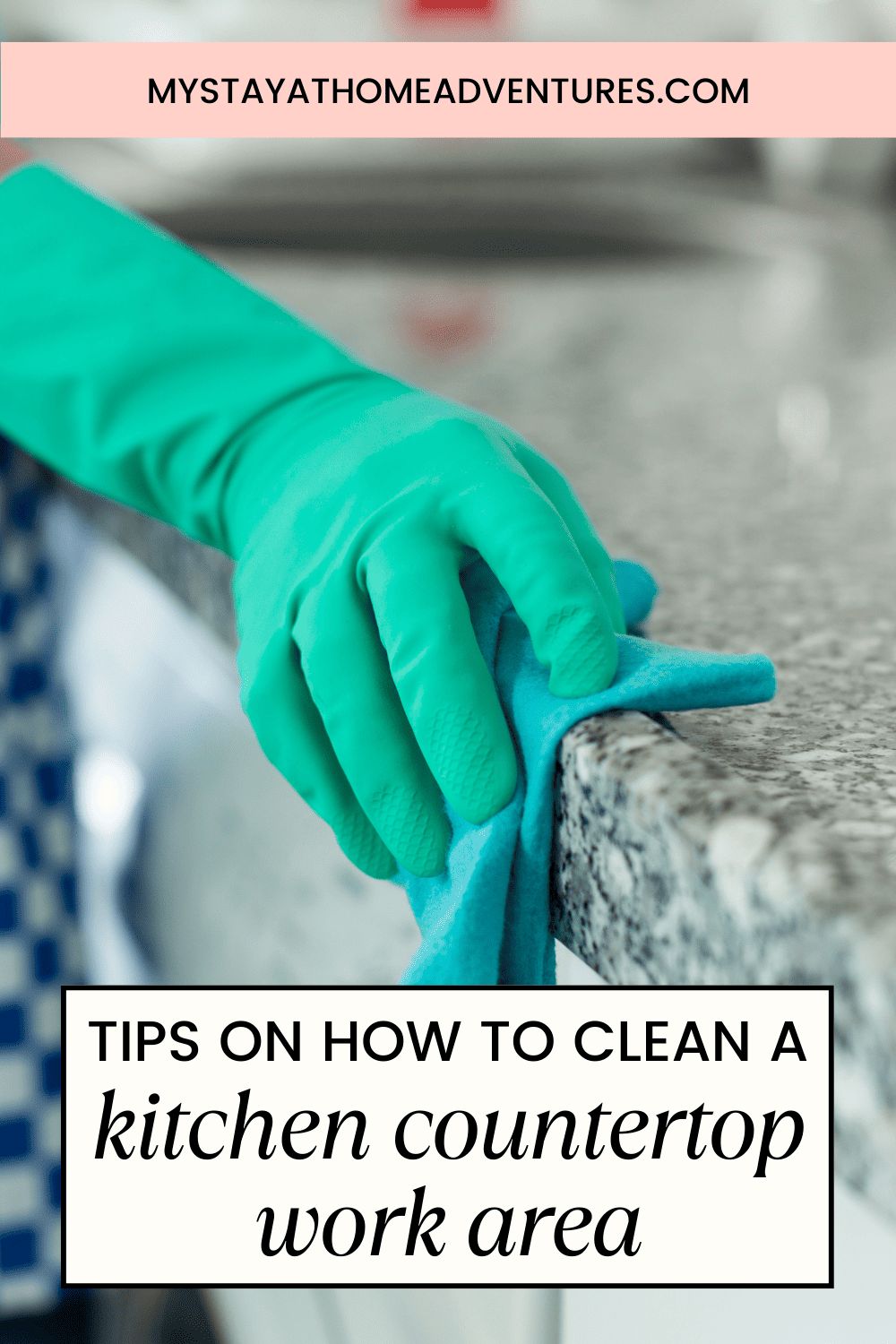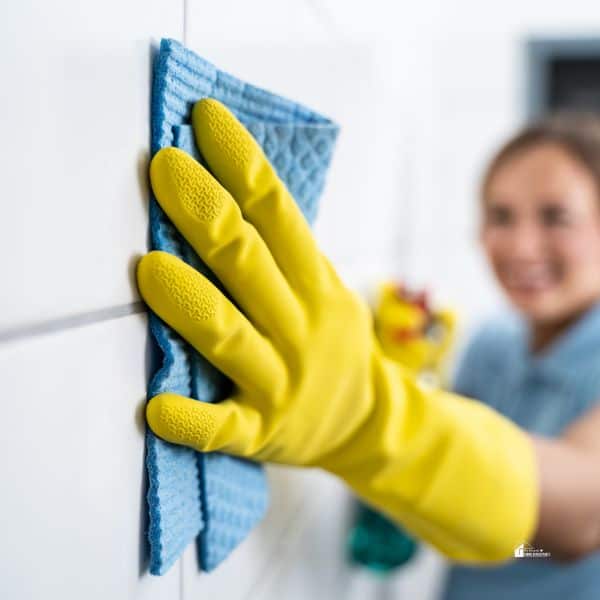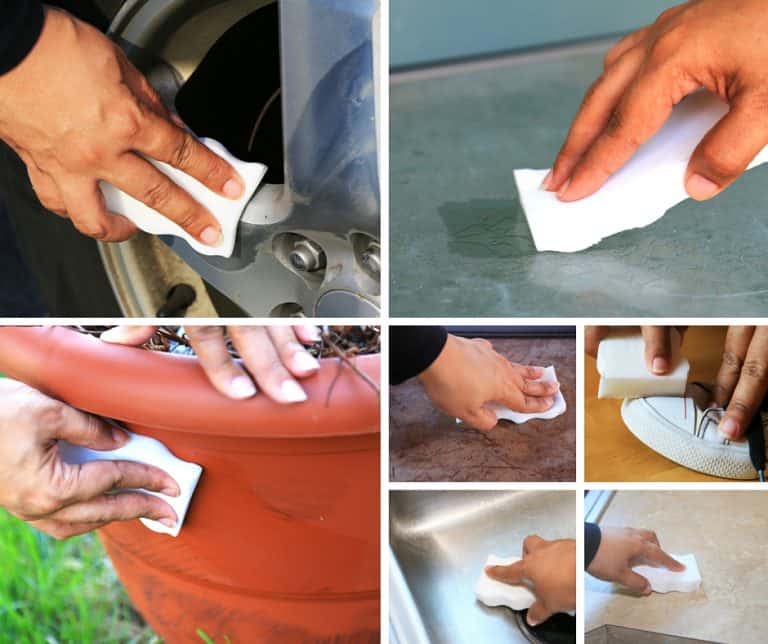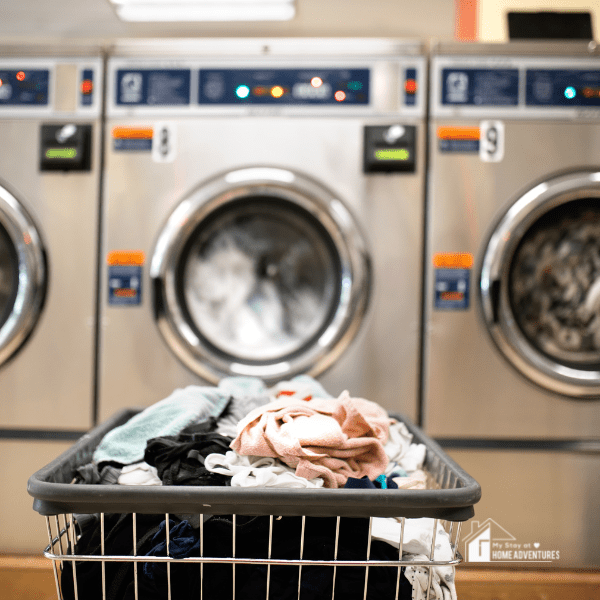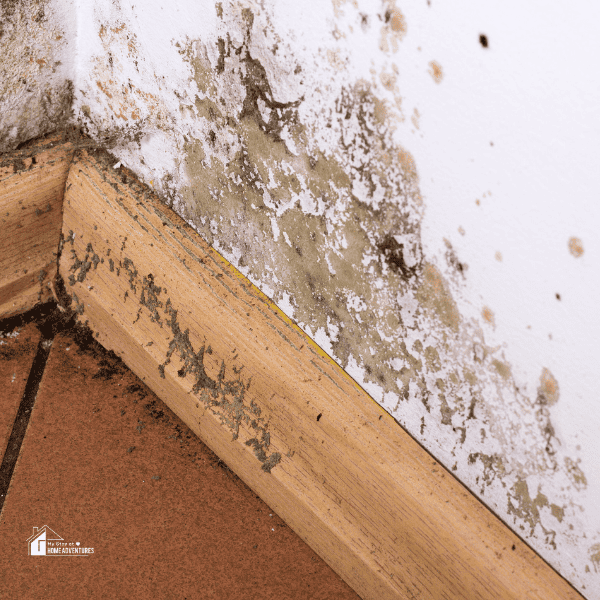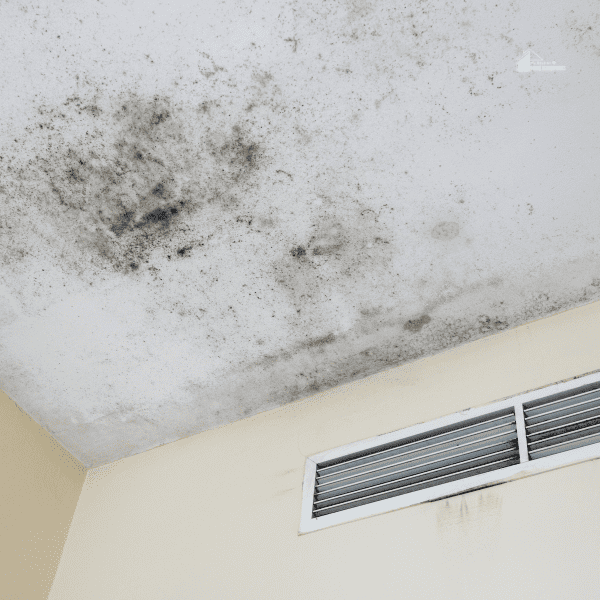How to Clean A Kitchen Countertop Work Area
This post may contain affiliate links which might earn us money. Please read my Disclosure and Privacy policies hereKeeping your kitchen countertops clean is essential for maintaining a hygienic and safe cooking environment. In this post, we'll provide a comprehensive guide on how to clean a kitchen countertop work area.
From everyday maintenance to deeper cleaning methods, we will cover it all. We'll also share some tips and tricks to keep your countertops sparkling clean, ensuring a healthy and safe environment for preparing your meals.
How to Clean A Kitchen Countertop Work Area
A clean countertop not only looks good but also helps to prevent the growth of harmful bacteria.
Let's discuss the importance of a clean kitchen countertop and provide tips on cleaning the work area effectively.
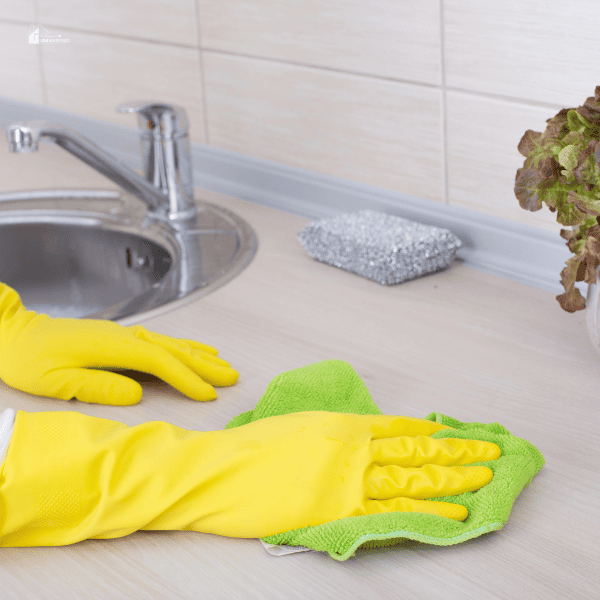
Benefits of a Clean Kitchen Countertop
A clean kitchen countertop is crucial for several reasons:
- Eliminating Bacteria: Bacteria can thrive on dirty countertops, leading to food contamination and potential health hazards. Regular cleaning helps to eliminate bacteria and reduce the risk of foodborne illnesses.
- Preventing Pest Infestations: Dirty countertops attract pests like ants and cockroaches, which can contaminate your food and spread diseases. Keeping your countertops clean helps to deter pests from entering your kitchen.
- Maintaining Food Safety: Clean countertops prevent cross-contamination between different food items, reducing the risk of food poisoning. It is essential to clean your countertop before and after preparing each meal.
- Enhancing the Appearance of Your Kitchen: A clean and tidy countertop adds to the overall aesthetic appeal of your kitchen. It makes your space look more inviting and organized.
Understanding the Work Area
The kitchen countertop is the primary work area where you prepare meals, chop ingredients, and handle various kitchen tasks. It is important to understand the different surfaces.
- Granite Countertops: Granite is a popular choice for countertops due to its durability and natural beauty. Its' tough surface can resists chips, scratches and heat.
- Quartz Countertops: Quartz countertops are engineered stone surfaces that mimic the look of natural stone. They are non-porous and resistant to stains and bacteria.
- Marble Countertops: Marble adds elegance to any kitchen but requires proper care to maintain its beauty. Marble is cool naturally but is porous and can stain.
- Wood Countertops: Wood being very durable can still get dents and scratches. They require regular sealing to protect them from moisture and stains.
Each type of countertop material has specific cleaning requirements, so it's essential to follow the manufacturer's recommendations to ensure proper maintenance. Keeping your kitchen countertops clean creates a healthy and inviting space for cooking and food preparation.
Materials Needed for Cleaning
Cleaning your kitchen countertops requires a few essential materials to ensure effective and safe cleaning. Here are the materials you will need:
Gathering the Necessary Supplies
- Cleaning cloths: Microfiber cleaning cloths, paper towels, or everyday kitchen towels will work just fine. It's best to have at least two—one for applying the soap and rinsing off the suds and one to dry the counters when you're done.
- Soft cloth or non-abrasive sponge: These tools will help you clean the countertops without scratching or damaging the surface.
- Plastic putty knife or scraper: Keep a plastic putty knife or scraper on hand to remove any stains or dried spills.
- Water and dish soap: Use warm water mixed with a bar of gentle, pH-neutral dish soap to clean the countertops without degrading the surface or its sealant.
- Disinfectant wipes or surface cleaners: These can be used to remove any lingering contaminants and disinfect high-touch areas of the countertops.
Choosing the Right Cleaning Products
When it comes to choosing cleaning products for your kitchen countertops, it's important to consider the type of material your countertops are made of. Here are some guidelines:
- Natural stone countertops like granite or marble should avoid acidic cleaners such as citric acid, vinegar, and bleach, as they can damage the sealant and harm the stone itself.
- For wooden countertops, use a non-abrasive cleaner and periodically refresh its protection with a food-grade conditioner.
- Quartz countertops can be cleaned with a gentle, pH-neutral dish soap and warm water solution.
- If you prefer to use specialized cleaners, make sure they are specifically formulated for the type of countertop material you have.
By using the right materials and cleaning products, you can effectively clean and maintain the beauty of your kitchen countertops for years to come.
Next, we will discuss the step-by-step process of cleaning your kitchen countertops.
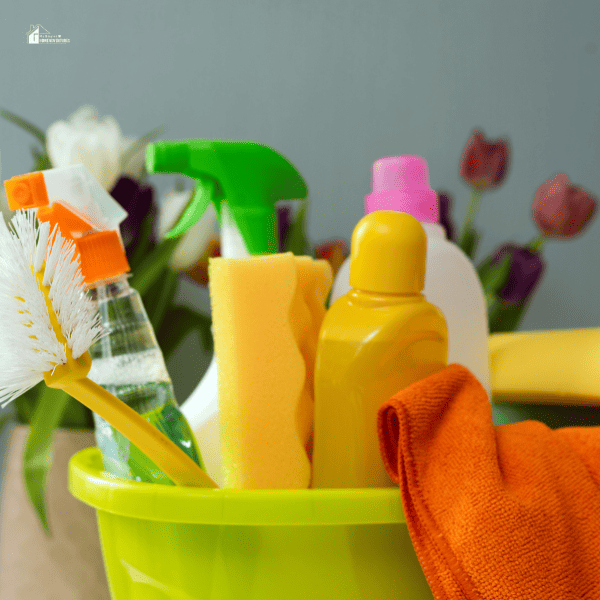
Preparing the Countertop
When it comes to cleaning your kitchen countertop, proper preparation is key to ensuring a thorough and effective cleaning process. Here are the essential steps to prepare your countertop work area:
Clearing the Surface
Before you begin cleaning, it's essential to clear the surface of your countertop. Remove any utensils, appliances, or decorative items to create a clutter-free workspace. This step will make it easier to clean and prevent any accidental damage to your belongings.
Removing Debris and Crumbs
Start cleaning by removing any visible debris and crumbs from the countertop surface. Use a paper towel, cotton cloth, or microfiber cloth to wipe away the dirt. You can also use a brush specifically designed for your countertop material to prevent scratches.
To ensure thorough cleaning, it is recommended to use a cleaning solution that is suitable for your countertop material. A neutral pH cleaner or warm water with dish soap is appropriate for wood, marble, granite, quartz, engineered wood, and stainless steel countertops. Laminate and soapstone countertops can withstand slightly more powerful cleaners.
Remember to rinse the countertop thoroughly after scrubbing to remove any residue from the cleaning products. Dry the surface using a soft cloth to prevent water spots or damage.
By following these preparatory steps, you'll be ready to effectively clean your kitchen countertop and maintain its cleanliness and appearance.
Cleaning Techniques
Keeping your kitchen countertops clean and sanitary is essential for maintaining a healthy cooking environment. However, different types of countertops require different cleaning techniques to ensure they stay in good condition. Here are some cleaning tips for different countertop materials:
Cleaning Granite Countertops
Granite countertops are a popular choice for their durability and natural beauty. To clean granite countertops, use a clean cloth dipped in warm soapy water and thoroughly rinse the surface. Avoid abrasive cleaners or scrub pads, as they can scratch the surface. For disinfecting, a mild bleach solution can be used. It's important to seal granite countertops to protect them from stains regularly.
Cleaning Marble Countertops
Marble countertops add elegance to any kitchen but require careful maintenance. Clean marble countertops with warm soapy water, avoiding acidic cleaners that can etch the stone. To remove stains, create a paste of baking soda and water and gently scrub the spot. Ensure marble countertops are regularly sealed to prevent stains and maintain their shine.
Cleaning Quartz Countertops
Quartz countertops are low-maintenance but still require regular cleaning to keep them looking their best. For everyday cleaning, warm soapy water and a microfiber cloth are sufficient. For tough stains, use a surface cleaner and a nonabrasive sponge. Avoid using abrasive or oily cleaners, which can damage the quartz surface.
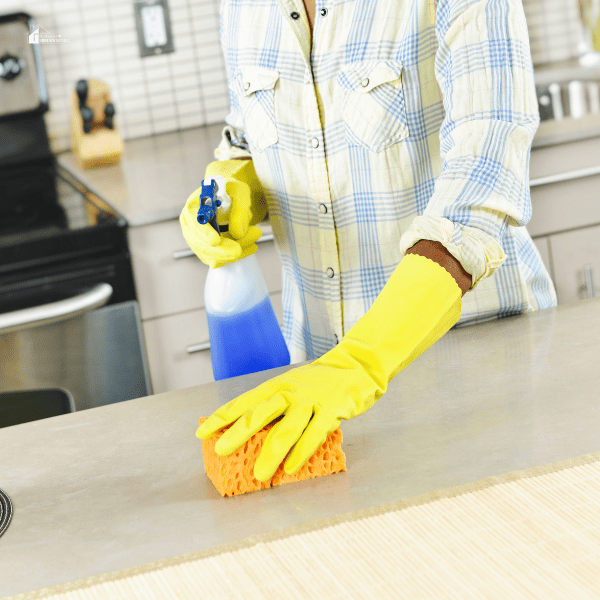
Cleaning Laminate Countertops
Laminate countertops are easy to clean and maintain. Use warm soapy water, a mild bleach solution, or a nonabrasive kitchen cleaner to clean laminate countertops. Avoid using abrasive cleaning pads or stiff-bristled brushes, which can scratch the surface.
For greasy buildup, use a vinegar and water solution or a paste of baking soda and water. No sealing is necessary for laminate countertops.
Cleaning Stainless Steel Countertops
Stainless steel countertops are durable and resistant to stains and heat. To clean stainless steel countertops, use warm soapy water and a nonabrasive cloth or sponge. Avoid using abrasive or acidic cleaners that can damage the stainless steel surface. Wipe the surface in the direction of the grain to avoid scratching.
Cleaning Wood Countertops
Wood countertops have a warm and natural appeal but require regular maintenance—clean wood countertops daily with a nonabrasive cleaner or a mixture of warm water and mild dish soap. Gently scrape off any food residue with a spatula or a metal pastry scraper.
Cut a lemon in half to remove stains and sprinkle salt directly onto the stain, then clean off with water and vinegar. Wood countertops should be sealed with food-grade oil or wax to protect them from warping and cracking.
Remember always to follow the specific cleaning recommendations for your countertop material to ensure longevity and beauty. Each material has its own maintenance requirements, so choosing the cleaning method suitable for your countertop type is important.
Disinfecting the Countertop
Keeping your kitchen countertops clean and free of harmful bacteria is vital for maintaining a healthy and safe cooking environment. Regular cleaning and disinfection of your countertops can help prevent the spread of germs and ensure a hygienic workspace. Here are some important steps to follow when cleaning your kitchen countertops:
The Importance of Disinfection
Cleaning and disinfecting are two different processes. While cleaning removes dirt, grime, and some bacteria from surfaces, disinfecting kills bacteria on contact. It's important to disinfect your countertops, especially after handling raw meat or dealing with spills.
Bacteria like salmonella, E. coli, and staphylococcus can survive on surfaces for hours or even days, so regular disinfection is necessary to maintain a healthy kitchen environment.
Choosing the Right Disinfectant
When it comes to disinfecting your countertops, you have several options. One effective and cost-efficient choice is using bleach. Make a solution of 1/4 cup household bleach (5 to 6 percent) and 2 1/4 cups water, and clean your countertops with warm soapy water before applying the bleach solution. Allow the treated surfaces to air dry.
If you prefer a more environmentally friendly option, you can use a combination of vinegar and hydrogen peroxide. These natural ingredients effectively kill germs but create a powerful disinfectant when used together.
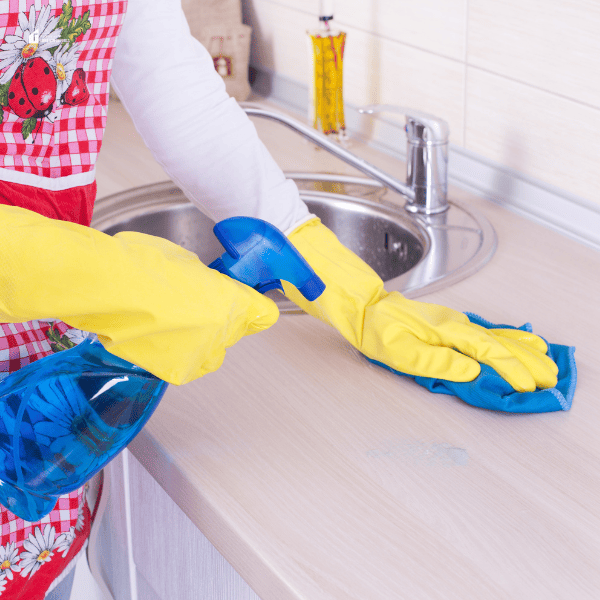
Proper Application of Disinfectant
To ensure effective disinfection, it's important to apply the chosen disinfectant properly. For bleach, clean your countertops with warm soapy water and then go over them again with the bleach solution. Allow the treated surfaces to air dry. However, if you decide to use a prepared disinfectant, make sure to read and follow the manufacturer's directions carefully.
Most disinfectants require a clean water rinse after application to remove any chemical residues. Remember not to spray disinfectants directly on or near foodstuffs.
Maintaining a clean and disinfected kitchen countertop is crucial for food safety and overall cleanliness. Regular cleaning and disinfection will help keep bacteria and other harmful germs at bay, ensuring a safe cooking environment.
Choose the appropriate disinfectant for your countertops, and follow the recommended application instructions to achieve the desired results. Keep your kitchen clean and green for a healthier cooking experience.
Stay tuned for more tips on maintaining a clean and organized kitchen!
Removing Stains and Residue
Keeping your kitchen countertops clean and sanitized is essential for maintaining a healthy and functional cooking space. Whether you have laminate, quartz, marble, butcher block, or concrete countertops, here are some tips on how to clean your kitchen countertop work area effectively:
Dealing with Stubborn Stains
If you encounter stubborn stains on your countertops, you can try several methods to remove them. For laminate countertops, apply a baking soda paste and let it sit for one to two hours before gently wiping it off. Be sure to avoid using abrasive cleaners or scrubbing pads as they may scratch the surface.
It's essential to seal marble countertops regularly to prevent stains. If a spill occurs, blot it immediately with a clean cloth, mild soap, and water solution. For tougher stains, seeking professional help from a stone care specialist is recommended.
Removing Grease and Oil Residue
Grease and oil residue can build up on your countertops, especially near the stove area. To remove them, use a mild dish soap and warm water solution. Gently scrub the affected area with a soft cloth or sponge.
Avoid using harsh chemicals or abrasive cleaners as they may damage the surface. For concrete countertops, it is important to apply a concrete sealer to prevent stains and water absorption.
Tackling Spills and Stickiness
Spills and stickiness can make your countertop work area messy and unhygienic. To tackle spills, clean them up immediately with a damp cloth and a mild soap and water solution. For stickiness, use a multipurpose cleaner recommended for your countertop material. Avoid using vinegar, lemon juice, or bleach on certain surfaces like granite and marble, as they can damage the sealant.
By following these cleaning tips, you can keep your kitchen countertop work area clean and pristine. Remember to read and follow the specific cleaning instructions provided by the manufacturer for your countertop material to ensure its longevity and beauty.
Regular Maintenance Tips
You can follow a few simple maintenance tips to keep your kitchen countertop clean and tidy. Whether your countertop is made of granite, marble, quartz, wood, or stainless steel, these tips will help you maintain its beauty and functionality.
Keeping the Countertop Clean
Clearing away debris or clutter is the first step in maintaining a clean and tidy countertop. Remove any items that are not regularly used on the countertop surface to free up space and prevent the accumulation of dirt and dust.
Next, wipe down the countertop with a clean cloth or sponge and a mild non-chemical liquid detergent. This will help remove any surface stains or spills. For tougher stains, you can use a paste of baking soda and water for oil-based stains or hydrogen peroxide for water-based stains. Apply the paste, let it sit for a few minutes, and then rinse off with water.
It's important to avoid abrasive or acidic cleaners that can strip the sealer and damage the surface of the countertop. Instead, opt for gentle cleaners and avoid using steel wool or scouring pads that can scratch the surface.
If your countertop is made of wood, clean it daily with a nonabrasive cleaner or a homemade mix of warm water with a splash of distilled white vinegar. Gently scrape off any food residue with a spatula or a metal pastry scraper.
Be sure to wipe the counters after cleaning so they are completely dry. Wood countertops should also be sealed for protection against warping and cracking. A food-grade oil or wax can be used as a protective coating.
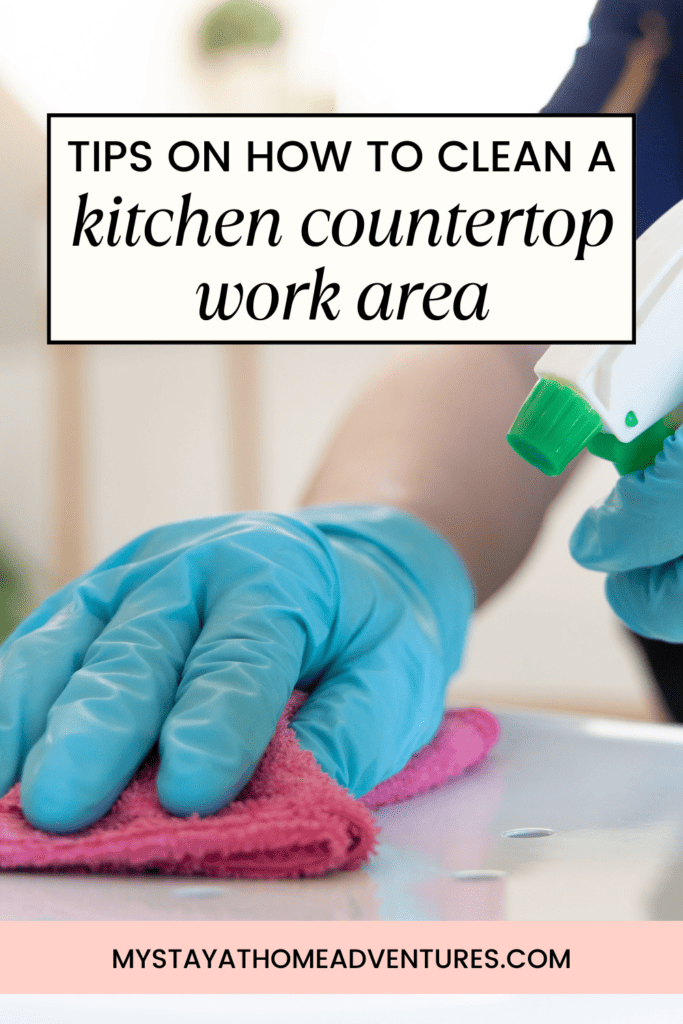
For granite or marble countertops, clean with a paste of baking soda and water for oil-based stains or hydrogen peroxide for water-based stains. Apply the paste, cover it with plastic wrap, let it sit for a few days, and then rinse off.
Remember to do a spot test first to ensure it won't affect the color or finish of the stone. Granite and marble countertops should be resealed regularly to protect them from stains.
Regular wipe-downs with soap and water are usually sufficient for stainless steel countertops. Use a microfiber towel and a cleaner specifically designed for stainless steel to remove smudges and streaks. Avoid abrasive scrubbing pads or steel wool to prevent scratching. Stainless steel countertops can also be polished occasionally using stainless-steel polish or lemon oil.
By following these regular maintenance tips, you can keep your kitchen countertop clean, tidy, and in great condition for years to come. Remember to choose cleaning products and methods suitable for your countertop's specific material to avoid any damage or discoloration.
Keeping your kitchen countertops and work area clean is essential for maintaining a safe and healthy environment in your home. Regular cleaning and maintenance can help prevent the growth of bacteria and germs, reduce the risk of foodborne illnesses, and extend the lifespan of your kitchen appliances.
You can ensure that your kitchen remains clean and hygienic by following simple cleaning practices, such as wiping down surfaces after each use, sanitizing countertops and cutting boards, and properly storing and disposing of food waste.
Remember to use appropriate cleaning agents and tools for different surfaces and materials to avoid damage. Baking soda, vinegar, and warm soapy water are effective natural cleaning solutions that can be used for most kitchen cleaning tasks.
By incorporating these cleaning habits into your routine, you can enjoy a clean and safe kitchen that is visually appealing and promotes good health and hygiene for you and your loved ones.

